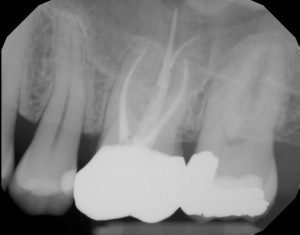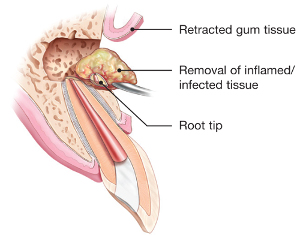
- Root Canal Treatment
- Retreatment
- Apicoectomy
- Vital Pulp Therapy
- Pulp Regeneration
Root Canal Treatment
Root canals are one of the most common dental procedures performed by endodontists. Also known as root canal therapy, root canals are performed on teeth with infected pulp to heal the diseased tooth and avoid extraction. This single treatment can help save your natural teeth and prevent you from having to get dental implants or bridges.
At the center of each of your teeth is a collection of blood vessels that provide structure and help form and calcify the tooth as it was growing. This collection of blood vessels is called the pulp. The pulp becomes injured or infected through trauma to the tooth, extensive decay, chipping or cracking, or through repeated dental procedures. Once the pulp becomes infected, it can be identified through visible injury or swelling around the tooth and sensitivity to pressure, pain, or temperature in the tooth and gums.
Retreatment
With proper care, your endodontically treated tooth will last as long as your natural teeth. Yet, pain may continue to exist or a tooth may fail to heal. Sometimes pain may occur months or years after treatment. If so, you may need an endodontic retreatment.
Some situations that may result in new problems or improper healing are
- Complicated canals were not detected during initial treatment.
- Curved or narrow canals weren’t treated.
- The restoration was not placed within the appropriate amount of time following the procedure.
- The restoration did not prevent saliva from contaminating the inside of the tooth.
New problems such as decay or a cracked or loose-fitting crown can also expose the tooth to new infection.

Apicoectomy
An apicoectomy is a removal of the very tip, or apex, of a tooth’s root. Also known as “root end surgery”, this procedure may be necessary if you have a persistent infection, pain, or swelling after having root canal therapy. If an apicoectomy is recommended by your endodontic specialist, this means that your tooth cannot be saved through a root canal or other endodontic procedure. The purpose of an apicoectomy is to preserve your natural tooth by removing the tip of the root.
Beyond this procedure, the next option is to remove the tooth. Because a tooth extraction can harm nearby teeth that are healthy, it is usually the last procedure your endodontist will recommend.

Vital Pulp Therapy
Pulp is found at the very center of every single tooth. Because of its location, we are not actually able to see it.
The main goal of pulpal therapy (also known as pulp therapy) is to save a tooth that is becoming infected. Even though baby teeth eventually leave the mouth, this therapy is in place so that children can keep their baby teeth as long as possible to be able to eat properly.
Having injured or infected pulp can be extremely painful. The pain typically does not go away on its own, and so it is important to seek out treatment as soon as possible. Some of the signs of infected pulp are unexplained pain in the mouth, pain during the night, sensitivity to warm and cold temperatures, and swelling or redness around the tooth.
Prior to having pulpal therapy, the dentist will take X-rays of the area to ensure that the treatment is necessary. This will also determine how much damage has been caused.
